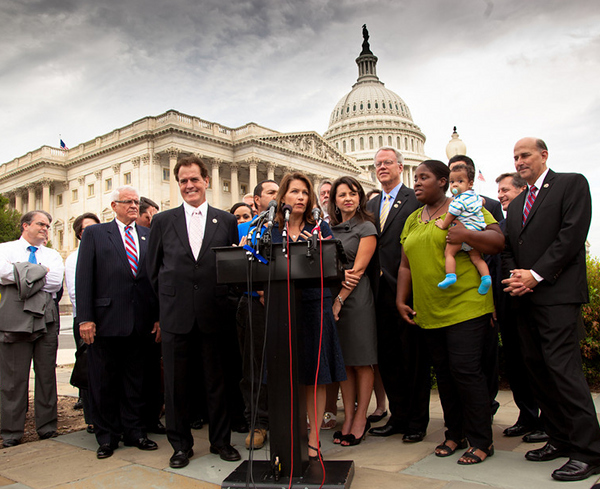Democrats and Republicans are prepared for a big fight over spending next year if the balance of power on Capitol Hill changes hands. Some are even forecasting a government shutdown. But that fight could actually come earlier than anybody expected, particularly if Republicans make huge gains in November. As Congress adjourns for elections season they’ve set the stage for a tussle over spending this year.
Late last night, Sen. Jim DeMint (R-SC) lost a little-noticed vote on government spending. In a hurry to hit the campaign trail, members of Congress left Washington without passing annual spending bills to keep the government running. Instead, Congress passed temporary legislation to keep the lights on temporarily — until December 3, to be precise. To DeMint, this was a direct affront — a ploy by Democrats to force a spending fight before newly elected members of Congress, mostly Republicans, are sworn in. He wanted Congress to keep the lights on until January, so the new Congress could make its own spending decisions.
His legislation failed, setting the stage for a loud political fight this fall.
“I’m concerned that if we debate spending in a lame duck session with Congressmen and Senators who are no longer accountable to their voters, and we ignore the new congressmen and senators who have just come in, that we’re going to end up being hotboxed to pass some big spending bill with thousands of earmarks under the threat of a government shutdown if we don’t pass it,” DeMint told TPMDC last night. “The resistance we’ve seen suggests that the plan in the lame duck is to pass an omnibus, and to threaten Republicans that if we don’t vote for it, the government will shut down.”
DeMint is right to be concerned. Democrats do indeed plan to pass what’s known as an omnibus spending bill in the lame duck session.
“We’re going to finish our appropriations work in December,” said Chaka Fattah (D-PA), a top House appropriator.
When they do, they can expect a lot of political backlash from the GOP, particularly if there’s a Republican wave in November.
“If it is as a lot of the pundits like Charlie Cook and Stu Rothenberg seem to think that it’s going to be a Republican wave — if that’s the case I think you will probably see emboldened conservatives prepared to take up the fight,” said Michele Bachmann (R-MN)
Of course, in a lame duck, Democrats will still enjoy majorities in both chambers, even if they lose big. That means they’ll technically still have a great deal of power, and can pass an omnibus as long as they can overcome a filibuster in the Senate. But for the first time in December, as the ground shifts under Democrats’ feet, we could get a glimpse of the gridlock to come next Congress.
“It would be the same group that is here now, the same group of representatives, but I have to wonder if the psychological fight will be out of the Democrats — if the wind will be out of their sails so to speak, because the public is clearly tired of this spending,” Bachmann said. “Republicans can go ahead and fight as hard as they can, and you can expect to see principled arguments coming out in a lame duck session… but Republicans don’t even have it within their bailiwick to be able to shutdown government now or [in December].”
“I don’t think anybody’s intent is to shut the government down. But I do think all options are on the table,” said Rep. Lynne Westmoreland (R-GA)
Indeed, it would fall to the Senate to block a big spending bill, and if Republicans feel sufficiently emboldened, they could in fact shut down the government. DeMint acknowledges the possibility, but worries his fellow Republicans don’t have the nerve to follow through.
“We’ll either have to pass another continuing resolution in November or December, or they’ll insert this omnibus bill that has the earmarks,” he said. “And what I’m afraid of is a lot of these retiring senators want to take on the bacon one last time.”
Numerous Democratic and Republican aides discounted the possibility of a full shutdown, though none doubted the potential for fireworks. But as Fattah warned, fireworks mean time, and time will be of the essence in a session where Congress must pass its appropriations bills, extend some or all of the Bush tax cuts, extend some or all of the tax cuts in the stimulus bill, and, perhaps, vote on the recommendations of President Obama’s debt commission.
“One way to look at it is, you know, the best predictor of future behavior is past behavior. When you have divided government you can have those kinds of stalemates play out,” Fattah said. “As political theater, will there be noise made? Yes. As a practical matter, will we fund the government? Yes.”










